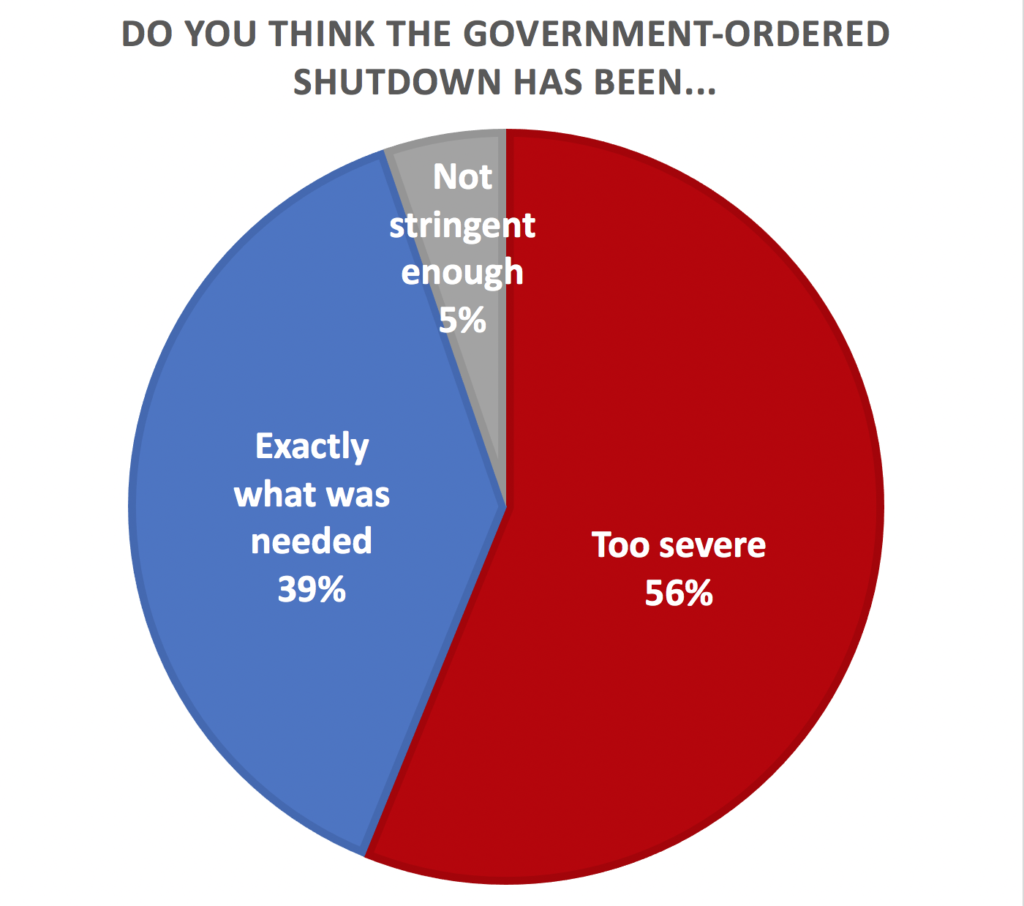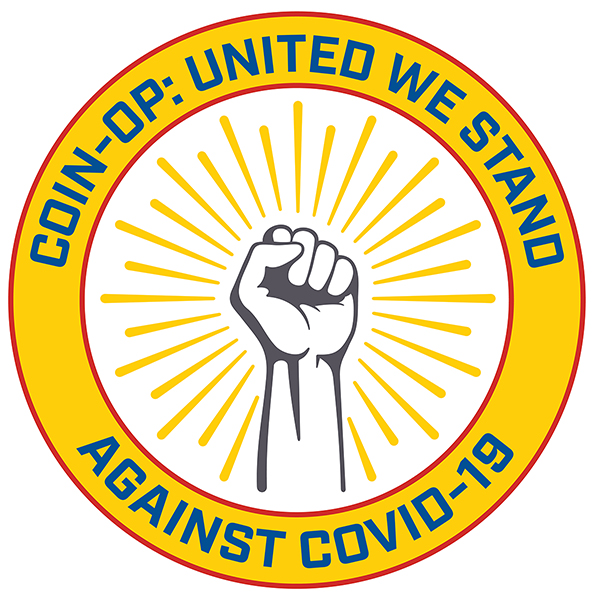Route Operators Ready to Work; Some Expect Location Loss & Uncertainty Ahead
By Matt Harding
As the world ground to a halt back in March, like just about every other business owner, route operators saw their cashflow drop to almost nothing. While some were able to earn a few bucks from ATMs or machines in laundromats and other essential businesses, most of their locations closed completely for the duration of the shutdown.
Now, as the economy begins to reopen in parts of the U.S. and around the world, operators are ready to start picking up the pieces. The outlook isn’t rosy, as our recent route operator survey indicates, but the industry is clearly ready to get back to work, implement necessary changes, and come back stronger than ever.
But everyone seems to agree that last bit will take a while. Every operator who responded to our survey said the recovery will be either “slow” (71%) or “extremely slow” (29%), but many also seem to at least think it’s here or coming soon with 21% of respondents saying recovery began in May and 41% saying it’ll begin in June (16% said July; 5% said August; 12% said “later”; and 5% said “much later”).
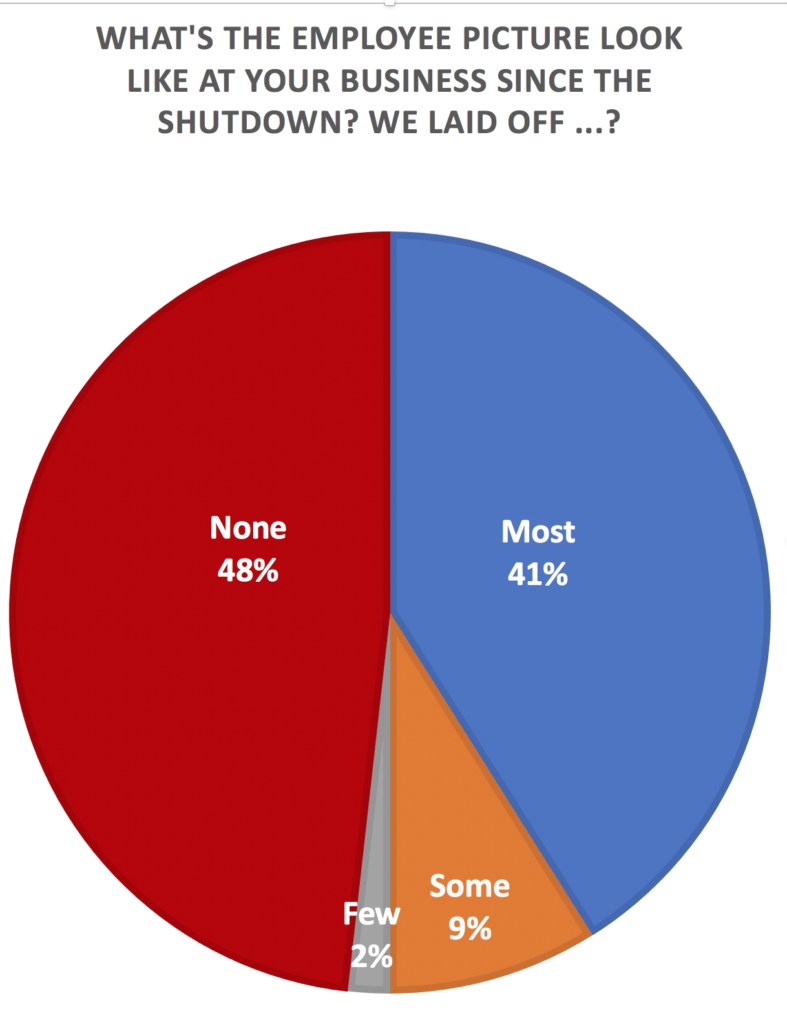
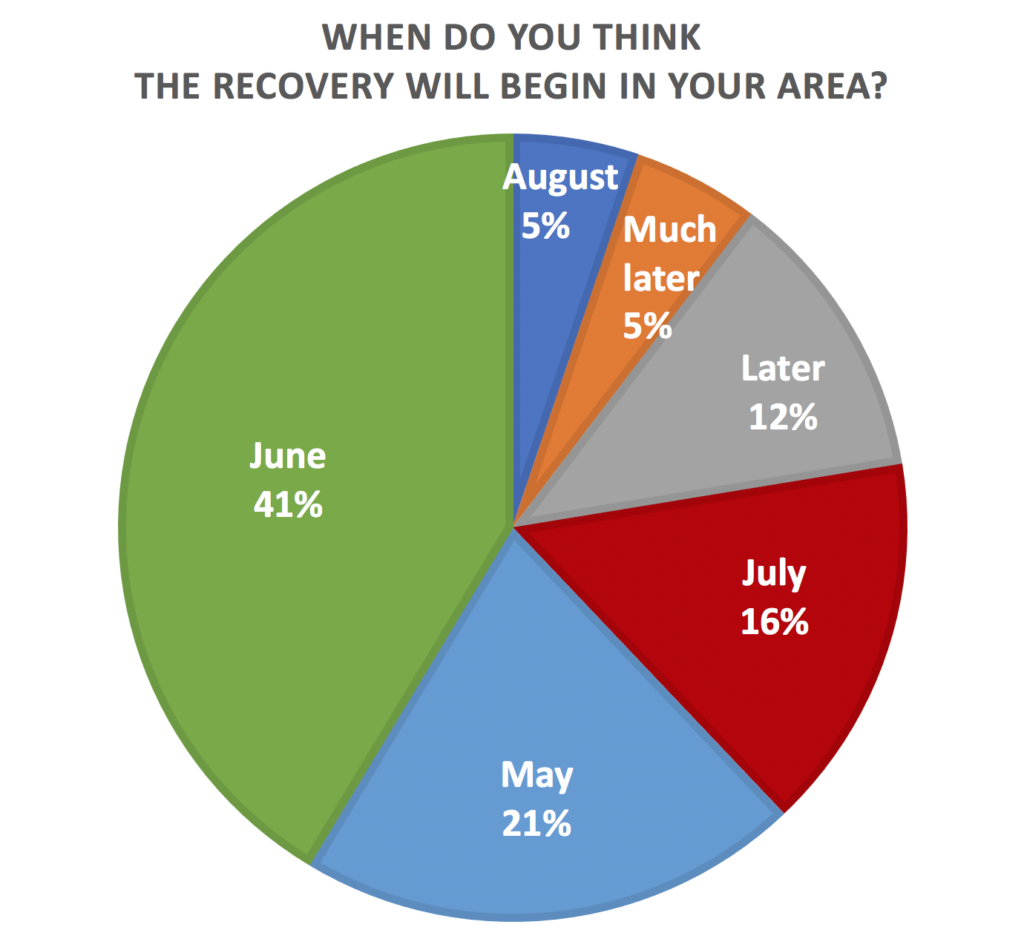 Unfortunately, the negative impacts from the shutdown have extended into the future for many, as 39% of respondents said they’ve already permanently lost at least one location. RePlay also asked operators what percentage of their route they thought might not reopen at all. The answers showed a wide range of possibilities – from those who were certain 100% would be back up and running to those who weren’t sure they’d be able to stay in business at all.
Unfortunately, the negative impacts from the shutdown have extended into the future for many, as 39% of respondents said they’ve already permanently lost at least one location. RePlay also asked operators what percentage of their route they thought might not reopen at all. The answers showed a wide range of possibilities – from those who were certain 100% would be back up and running to those who weren’t sure they’d be able to stay in business at all.
“A good street and games operator will be diverse enough to adjust and survive,” said one anonymous respondent who operates in Missouri and Illinois.
“This industry has always been able to weather the storm during other downturns in the past,” added a Minnesota operator. “It will get through this crisis, but there will be casualties.”
While there were more optimistic and more pessimistic responses, the sentiments shared by those two operators seem to make up the majority – that things look bleak now, but that businesses will “change or die” in the post-shutdown landscape.
Kenneth Collins of Collins Amusement in Roanoke, Va., was one of the 56% of route operators who thought the government shutdown was “too severe.” Meanwhile, 39% said it was “exactly what was needed” and 5% said it was “not stringent enough.”
“I’m not putting the economy over anyone’s life, but what do you think keeps us alive? It’s the economy,” Ken said, adding, “We will take steps to sanitize machines as much as we can. It’s not possible to clean machines after every play. Touching things doesn’t mean death. I pray society still realizes that. So much uncalled-for fear out there right now.”
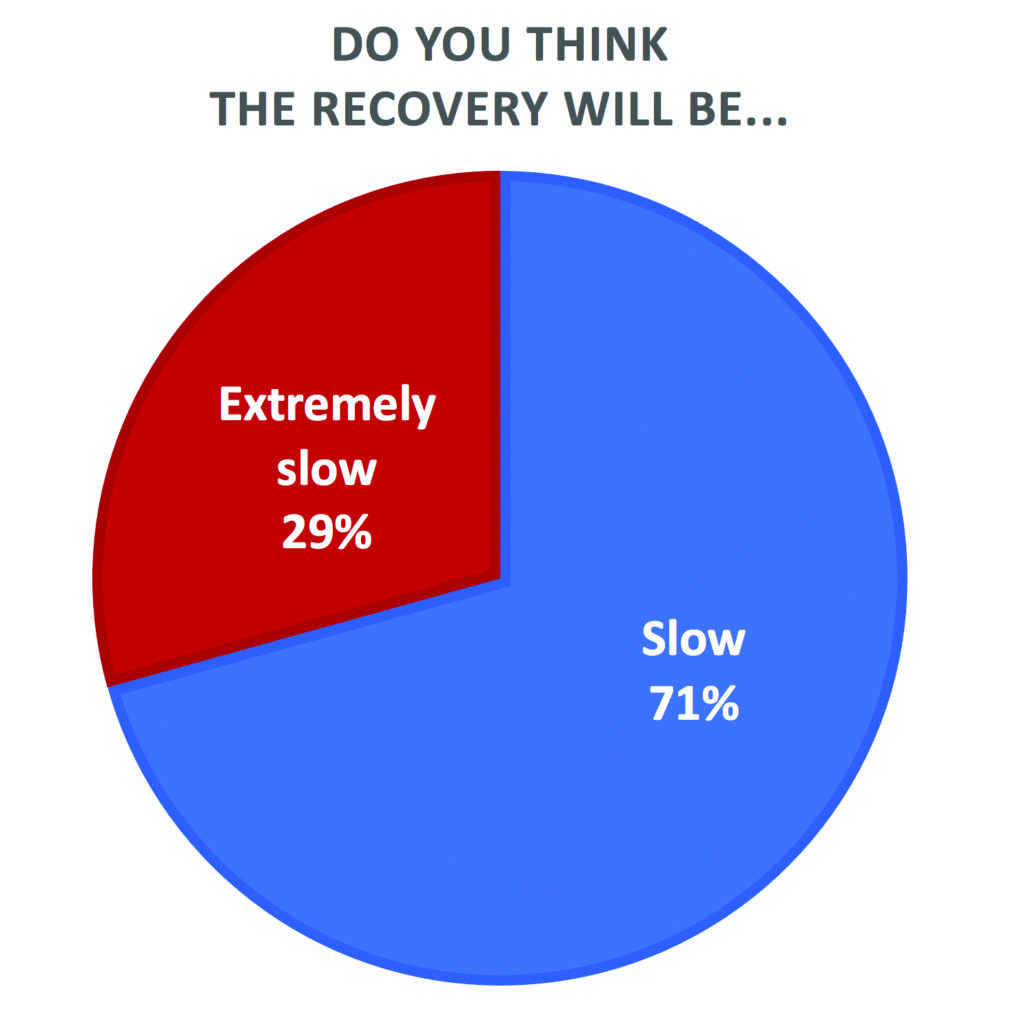 Collins believes all of his route will fully open at some point. In the interim, he’s dealt with about 20% completely closing, 40% only offering food or beverage takeout and the remaining 40% being convenience stores with shortened hours. He reports his stores with skill games were actually fairly well-performing by late April.
Collins believes all of his route will fully open at some point. In the interim, he’s dealt with about 20% completely closing, 40% only offering food or beverage takeout and the remaining 40% being convenience stores with shortened hours. He reports his stores with skill games were actually fairly well-performing by late April.
While Collins doesn’t expect recovery to begin until the fall, he’s still pretty optimistic. “I think locations will be desperate for new revenue streams and they may open the doors for us now,” he said. “We have to think positive. Get out there now if it’s a partially open location and drop off your info. They are slow now and they may have the time to talk about new ideas.”
He added: “This too shall pass. We have to remember that the public is starved for entertainment now. Zero sports. Zero summer festivals. We are their escape from this bizarre time.”
Michael Gorbett from Get-A-Grip Vending Company in Springfield, Ill., is a bit less optimistic, saying he expects 10-15% of his route to cease operations permanently. About 75% of his locations closed completely through the shutdown. The remaining are bars and restaurants doing takeout only. None have been open for “business as usual.”
“I’m terrified that I’m going to have a warehouse full of equipment when and if this ever shakes out,” Gorbett said. “My locations are predominately bars and restaurants, and I have been seeing reports that 11% of restaurants will never reopen their doors again. Bars I’m not sure about, but social distancing doesn’t really work at all in a bar or tavern, (hard to drink a beer though a face mask). I’m afraid that this might be the “death nail” for our already struggling industry!”
Even though he’s expecting an extremely slow recovery, Gorbett has been busy prepping equipment, organizing his warehouse and cleaning – “and cleaning some more!” he added.
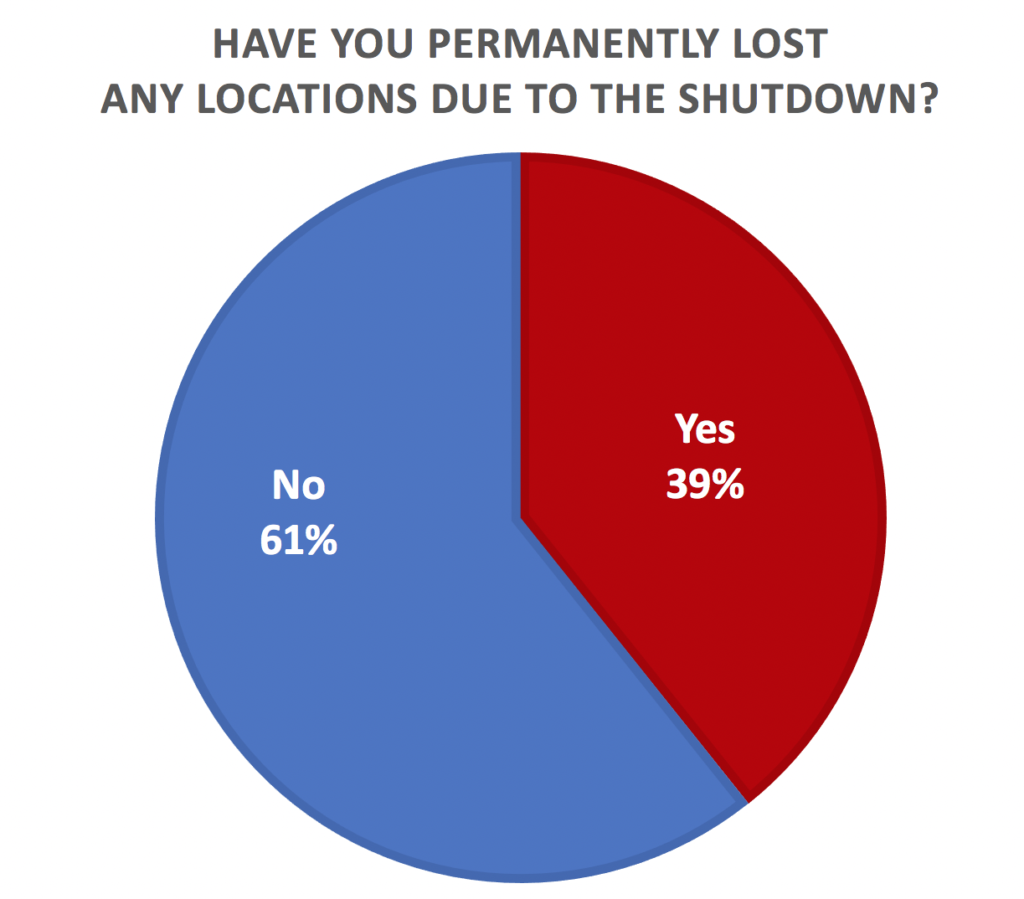 Steve Belmonte, owner of Patriot Vending, which operates in Massachusetts, New Hampshire and Maine, said daily cleaning will be an important part of his routine as well. He’s been busy finishing renovations on his new bowling alley, Gametime Lanes and Entertainment in Amesbury, Mass., where hand sanitation stations will be added. Belmonte expects to rehire employees after the lockdown lifts, but likely won’t purchase new equipment until at least IAAPA Expo in November.
Steve Belmonte, owner of Patriot Vending, which operates in Massachusetts, New Hampshire and Maine, said daily cleaning will be an important part of his routine as well. He’s been busy finishing renovations on his new bowling alley, Gametime Lanes and Entertainment in Amesbury, Mass., where hand sanitation stations will be added. Belmonte expects to rehire employees after the lockdown lifts, but likely won’t purchase new equipment until at least IAAPA Expo in November.
Alan Kendrick of Albright Vending Service in Bishop, Calif., said 95% of his locations closed completely for the shutdown, and there’s some uncertainty as to whether or not all of them will open back up at some point.
“I think it might be a little early to open bowling alleys and arcades,” Kendrick said in his late April survey responses, “However, I am ready to get back to work and start the cash flow again.” Right before the lockdown, he was preparing to set up a new arcade in a local bowling alley. Plans to be ready by Memorial Day quickly stalled.
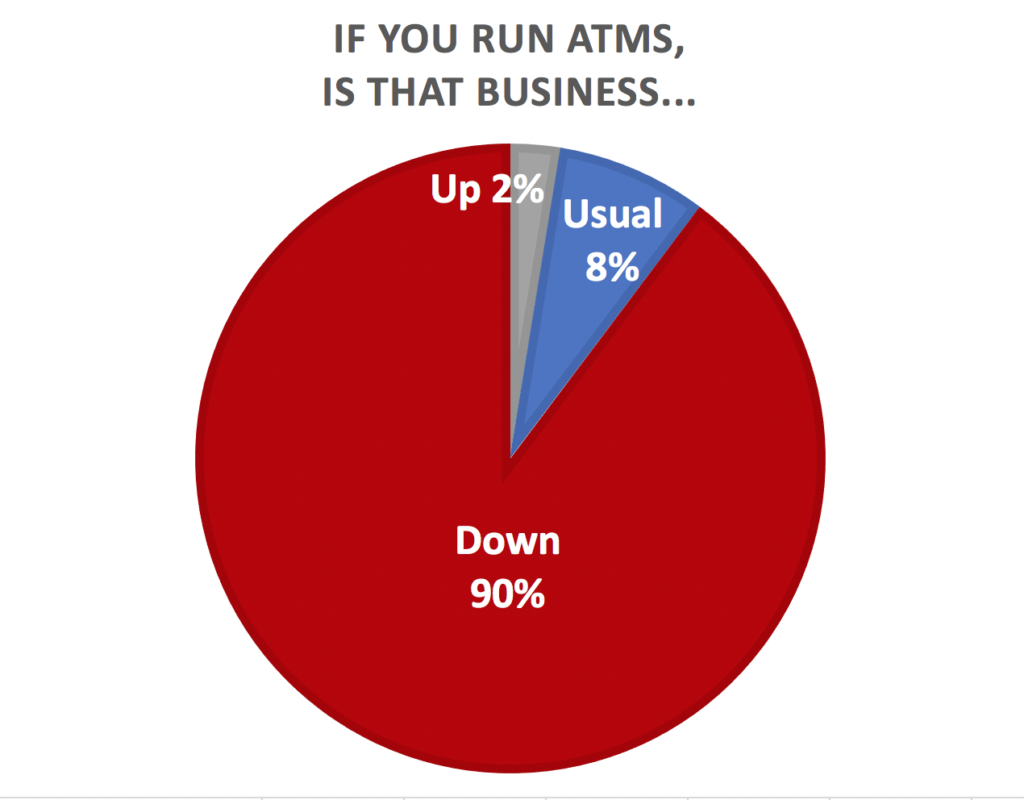 “I’m making payments on machines that are not bringing in any revenue,” he said. To keep some money flowing in, Kendrick has been doing some private pool table jobs.
“I’m making payments on machines that are not bringing in any revenue,” he said. To keep some money flowing in, Kendrick has been doing some private pool table jobs.
But as for the brunt of his business, only time will tell what makes a successful comeback and what doesn’t.
“I really have many questions right now,” he noted. “I currently have no games, jukeboxes or pool tables operating at this time. Most of my jukeboxes and pool tables are in bars and saloons. It depends on when the state will let these types of locations reopen, and with what restrictions. No matter when these locations open, it will be gradual. With the high unemployment rate, I’m not sure how many people will have money to spend on pool, games or the jukebox.”
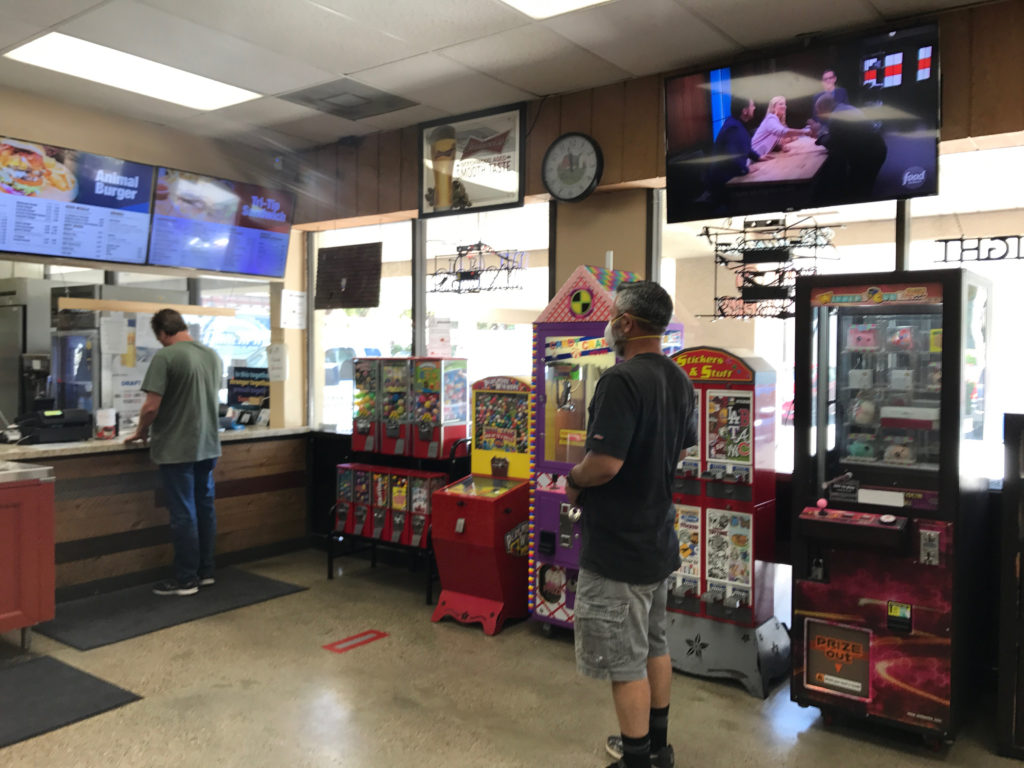
Operator Chip O’Hara at Midwest Coin Concepts in Waite Park, Minn., said being proactive will help speed up a slow recovery. “I think it’s important to try and get out in front of this by implementing our own stricter standards in-house with additional hand sanitizing areas,” he said, adding, “We will have protective masks and gloves available for our employees, along with bleach wipes, disinfectant cleaner as well as standard, everyday window cleaner.”
He continued: “This whole sanitation thing is an issue we won’t take lightly. As an industry, we run the risk of the removal of equipment, especially in one to three-machine locations.” The business has taken a big hit, and O’Hara anticipates losing about 10% of the route due to the shutdown.
“We have spent a fair amount of time making our own assumptions and trying to create our own model as to what this may look like on the other side,” he said. “We have really concentrated in the areas of collections and processes, promotions and relaunch. One thing we have done is experimented with outdoor mobile app signs for curbside pickup.”
Taking an optimistic approach, O’Hara said through any hardship, “you learn to hopefully come out the other side faster, better and smarter.” He concluded: “This is an industry made up of smart, resourceful and resilient people. Keep talking, asking for and sharing ideas.”
Dan Brown, owner of Upstate New York’s D.A.N. Enterprises, said 90% of his locations have closed completely, and he’s uncertain about how many will remain post-lockdown.
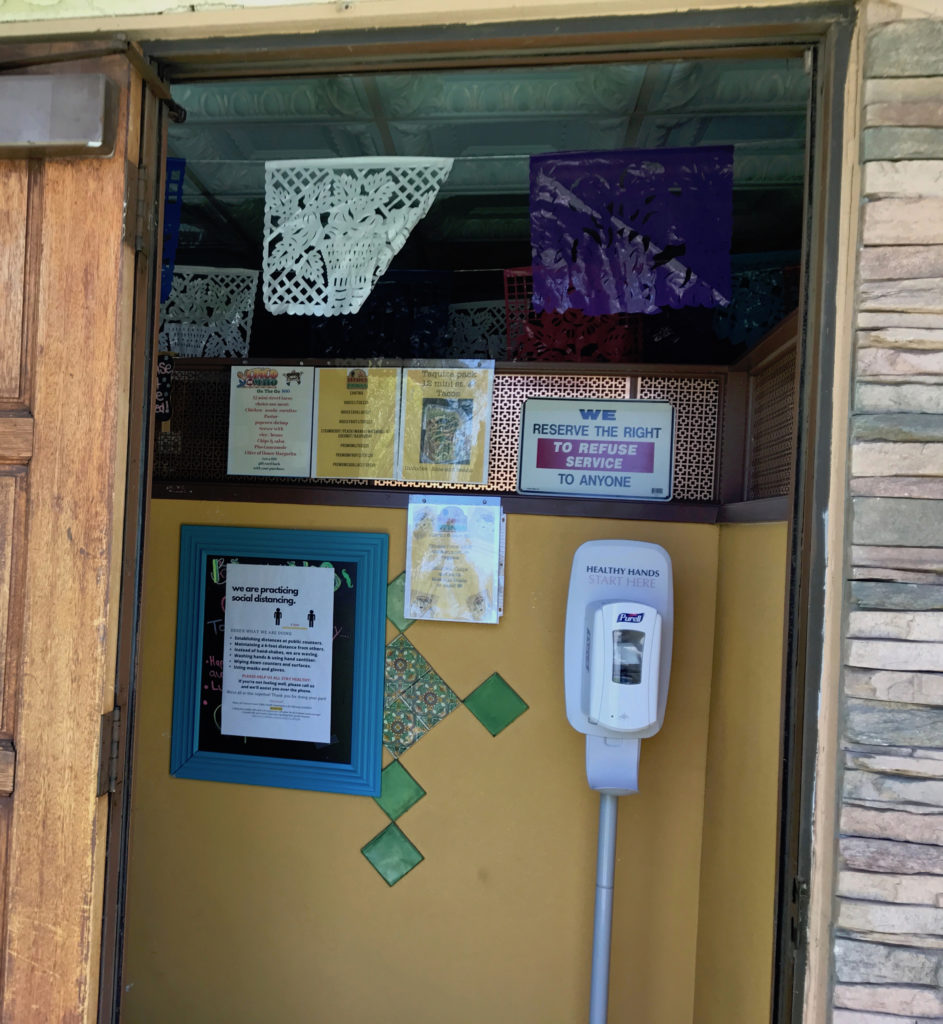
“We will be at 25-40% volume initially, and may trend up over an extended period of time, but I don’t ever see a complete recovery,” he said. “Times are going to change. We will continue to see consolidation while expenses will remain the same and revenue will continue to shrink.”
With 46 years in the business, Peter Jones of The Ragman Billiards is a tavern operator in the Kamloops, B.C., Canada region. He expects a slow recovery to begin in June, and won’t be buying any major equipment for at least six months. Despite all of his locations being shut down, Jones added, “We have a billiards store too and that stayed open with distancing. Sales are good. People are getting bored and that’s good for us.”
They’ve also been updating their inventory, re-veneering and recovering all their coin-op tables in stock and will rotate them into the route over the next six months or so, based on when locations are able to reopen.
However, he’s not expecting things to go great. “I think revenues will be soft for the rest of the year. Every time revenues pick up, there will be another scare. That will keep people skittish and drinking at home.”
AJ Kress, who owns Florida Music Co. in Vero Beach, Fla., and is also the president of AMOAF, took the lockdown time to reassess his route and locations.
“We are pushing ahead with plans to purchase new jukeboxes and ATMs in the near future,” he said. “We have identified those machines on our route that need to be rotated down and now is the time to accelerate that process. We want our customers to open back up with new equipment where possible to help create that excitement.” The silver lining in the lockdown, which he said caused 99% of his route to temporarily shutter, is that interest rates will be low for a while, adding, “This is the time to buy new equipment and upgrade our route.”
But Kress admits that the recovery will be slow, and that he sees issues going forward with sanitization. “All of our equipment is hands on,” he said. “From the cigarette machine, jukebox, trackball on the golf, to the ATM, people have to touch it. While we plan on having the route drivers wipe down every visit, the locations are going to have to take a proactive role in this.”
That’s why it’s been important for him and other operators to stay in touch with their location owners and managers throughout the shutdown. According to our survey, 67% of operators have been calling their locations, 52% have been visiting them, and 30% have been emailing them (and as the results indicate, operators have been using more than one method).
Kress said all his locations have told him they plan to reopen. He also singled out a few companies that have been instrumental in getting him through the economic hit to business. TouchTunes, Firestone Financial and Univest Capital all deferred payments and provided a wealth of information, he said. Plus, TouchTunes and Firestone had webinars where he could “ask questions and more importantly vent our frustrations.”
Charles Rowland of Games People Play in Richmond, Va., said he’s been fortunate over the past couple of years and has continued to pay his employees in full despite the fact they’re only working one day a week.
While 95% of his route was closed by the shutdown, he has 14 ATM locations and a convenience store that have stayed operational throughout. Rowland said he won’t be buying new machines for a while – he’s waiting to see how many locations reopen. In the meantime, he’s been recovering all the pool tables in his warehouse.
“I’m waiting to see what restrictions will finally come out when this is over related to cleaning, number of customers, etc.,” he said, adding, “Americans have short memories. You’ll be surprised how fast it all comes back.”
Also playing somewhat of a waiting game is Chris DeSarro of East Liverpool, Ohio’s 1st Class Coin. Aside from some ATMs and convenience store locations, his route was also shut down almost entirely.
He foresees a slow recovery, but especially is waiting to buy new equipment and do things of that nature until 1. He sees at what levels customers will come back to the bars and 2. If we’ll get hit with a second wave of the virus that causes additional closures.
“I think that people may be reluctant to come back into bars, and I feel customers and employees will socialize differently,” DeSarro said. “I think it could take a while to get back to where it was before all of this happened. There will definitely be a learning curve with practicing social distancing, etc.”
Bob Thomas, who operates Minnesota Pastime, based in the town of Virginia, Minn., has also had a rough go of it with about 95% of his route closed. Like many operators, he’s branched out into ATMs over the years, but they only account for the 5% of his route that remains open.
Even still, it’s not like the ATM business is thriving. A total of 90% of RePlay survey respondents who operate ATMs reported business is down. Only 8% said it was the same as usual, and a mere 2% said it was up recently.
As for Thomas, he’s cautiously optimistic that business will remain despite an extremely slow recovery. “We are not expecting a return to normal for more than a year,” he said. “I figure a slow 20% start. People have been educated to fear. However, I believe our memories are short and within a year business should return to about 80%.”
On a similar topic, Thomas Sauvageot of Best Amusements Leasing in Spring Hill, Fla., is less optimistic. “I don’t think the business will go back to where it was for a long time, if at all,” he said. “I actually think a lot of people are going to close and operators are going to go out of business.”
Phil Juckem of All Brands Tampa Bay also thinks places like restaurants will stay slow, but bars may fare better. “I think bars will do well if the customers have money from work – if unemployed, not so much,” he said.
“People are learning a lesson about working from home and social distancing,” he continued. “So that creates a worry for the long-term development of social skills while at the same time creates pressure to go out and find some human interaction. Perhaps Friday/ Saturday night venues offering the right social mix will find much success.”
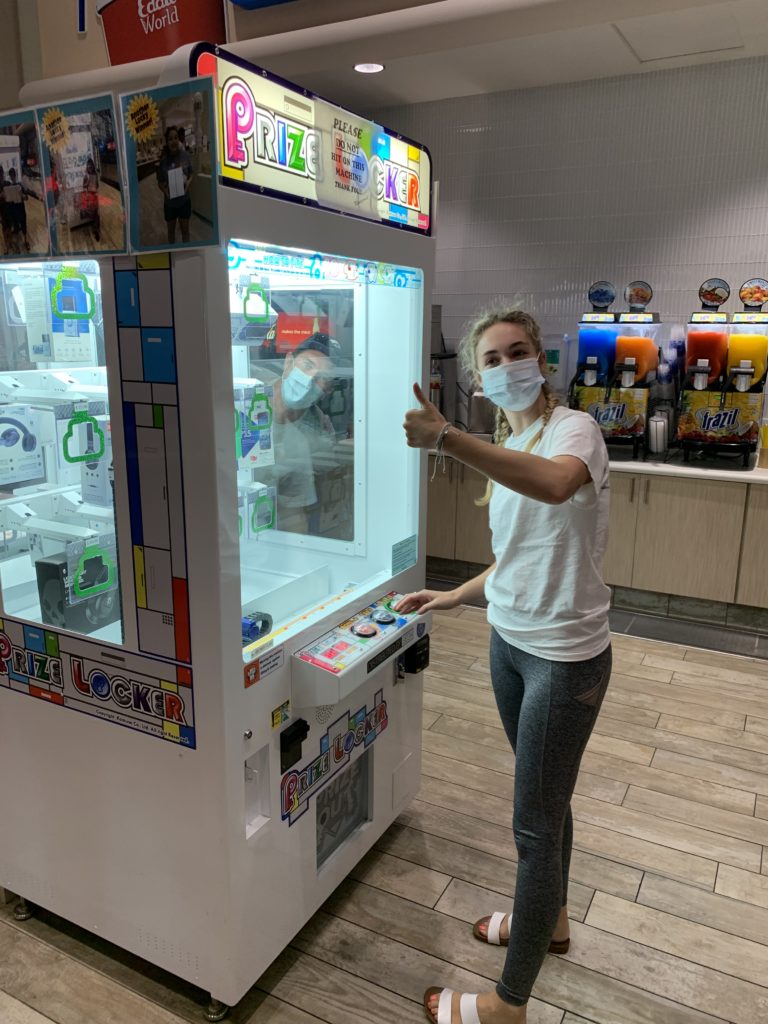
Many other operators offered their opinions anonymously – ranging from those with positive outlooks to ones who’re near sure their business is forever changed if it can continue at all.
One Nevada operator whose route shut down entirely expects only a 3-5% permanent loss of locations when the “extremely slow” recovery starts to come. “Street operations like ours will be flexible and more adept at adjusting to the new normal,” the operator said. “Larger FECs and fixed locations will find it difficult to change and not all will survive. Unfortunately, this may also hold true for manufacturers who have focused these last years entirely on the FEC industry, forgetting about the small street operators.
“Manufacturers who want to survive will have to try to provide smaller, reasonably priced street route pieces. I don’t see the FEC market returning to their previous buying habits for a year and a half or longer and even street operators will be slow to get back to making any substantial equipment purchases for the next year.”
What the new normal may be, the operator added, will be anyone’s guess. “People’s habits will have changed and the day they feel safe in crowds could take many months or possibly a year or more if this comes back in the fall.”
A Massachusetts operator said their hard-hit state has ensured all of his locations were closed – aside from what little money is to be made from a pinball machine in a laundromat. “I am currently calling all our utility companies and insurance companies to tell them we have no money to pay, so buying new machines or supplies will be at a standstill for most of 2020.”
An operator who runs a route in Missouri and Illinois said there will be opportunities to come out of this bad situation, but that “the consequences of the last 60 days will outweigh those opportunities for a considerable amount of time.” Still, the fellow added, “A good street and games operator will be diverse enough to adjust and survive.”
One Kentucky operator has a similar outlook, despite taking an economic hit in the past few months. “We think that the amusement industry will be slow to get started up again, just because the general public will and should be cautious, but in the end, we will be ok and a vital part of the recovery for our clients.”
Slow going but going nonetheless is how one Minnesota operator sees it: “Business is going to be slow for a while. It could take over a year to get business back to levels that are sustainable long term. Unfortunately, staffing levels will be reduced for some time as reflected by lower sales volume. We will still need to invest in new equipment. If we don’t, we will not survive. Operators must work to get better commission splits to support the investment. 50/50 won’t work anymore and really hasn’t for a few years.”
The operator added: “We will be very focused on cleaning and sanitizing. We need to make people comfortable and safe playing our games.”
An Indiana operator said the business will see “shrinkage” in many regards for the next 18 months as some locations won’t be able to reopen. “We have missed our busiest time of the year and are entering a very slow season. Every day our locations are forced to remain closed – the odds of another location not making it through the next 12 months seems to increase.”
A Florida operator put simply: “Until there is a vaccine, there is no way around the virus. We can’t stop living to avoid getting sick.”
No matter the diversity of opinion from the operators who responded to our polls, one thing is for certain to them – a slow recovery. Yes, that could mean permanent loss of locations for some. Uncertainty for many more. But one thing does seem certain – that the industry will make some changes and work to not only survive, but maybe even thrive into the future.

